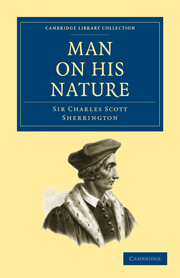Book contents
- Frontmatter
- Preface
- Contents
- Illustrations
- I Nature and Tradition
- II The Natural and Superstition
- III Life in Little
- IV The Wisdom of the Body
- V Earth's Reshuffling
- VI A Whole Presupposed of its Parts
- VII The Brain and its Work
- VIII The Organ of Liaison
- IX Brain Collaborates with Psyche
- X Earth's Alchemy
- XI Two Ways of one Mind
- XII Conflict with Nature
- Index
II - The Natural and Superstition
Published online by Cambridge University Press: 07 September 2010
- Frontmatter
- Preface
- Contents
- Illustrations
- I Nature and Tradition
- II The Natural and Superstition
- III Life in Little
- IV The Wisdom of the Body
- V Earth's Reshuffling
- VI A Whole Presupposed of its Parts
- VII The Brain and its Work
- VIII The Organ of Liaison
- IX Brain Collaborates with Psyche
- X Earth's Alchemy
- XI Two Ways of one Mind
- XII Conflict with Nature
- Index
Summary
Come son fisse
Le stelle in cielo!
What spell is keeping
The stars so steady?
D. G. Rossetti.Videmρ moderno tpe multos lapides virtutihus olim sibi attributis deficere.
We see that in modern times many stones lack the virtues formerly attributed to them.
Petrus Garsias Episcopus.ad sanctissimũ patrem et dñtn Innocentiũ papã viij in determinationes magistrales contra tondusiones Joanni Pici Mirandulani.
Rome, 1489.Our sixteenth-century physician-philosopher, Jean Fernel, supposed in the body a something incorporeal. The material body did not work itself. The body was tenanted by a principle which made it ‘live’. In respect of the acts of the body the corporeal substance of the body was as a tool in the hand of a craftsman, the craftsman being that incorporeal tenant of the body. Fernel supposes this not only of man but of animate creation generally. In other words, there is throughout animate Nature a living principle which informs its bodies with life.
This living principle and its activities in the body, Fernel now proceeds to describe. His description purports to be a description of the principle. But the principle is incorporeal substance; it offers beyond that no data for description. We have seen already how when calling it in Aristotle's sense ‘form’ Fernel has settled that it is non-elemental heat, and has derived it from beyond the stars. The description he embarks on now resolves itself into an account of what it does, this principle of life, which has the body for its field of operation.
- Type
- Chapter
- Information
- Man on his Nature , pp. 33 - 66Publisher: Cambridge University PressPrint publication year: 2009First published in: 1940



